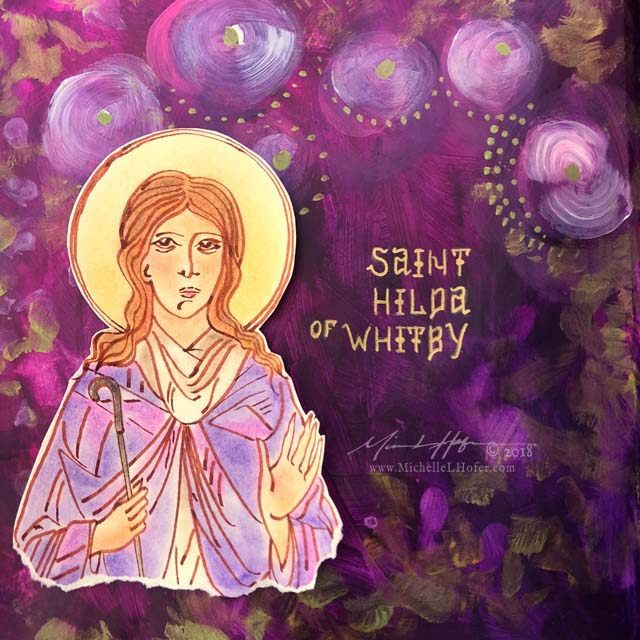Saint Hilda of Whitby

Appropriately and affectionately, Hilda was known simply as “Mother” to the people of her day. Her piety, grace and regard for learning set Hilda as a person of influence over the lives of many in 7th century England.
Historian, Bede, tells us how from the time of her infancy, having been born in tumultuous times into the royal court of Northumbria in the year 614, it was prophesied through the dream of her mother just how respected and revered Hilda would become:
For it was meet that the dream of her mother, Bregusuid, during her infancy, should be fulfilled. Now Bregusuid, at the time that her husband, Hereric, lived in banishment, under Cerdic, king of the Britons, where he was also poisoned, fancied, in a dream, that he was suddenly taken away from her and she was seeking for him most carefully, but could find no sign of him anywhere. After an anxious search for him, all at once she found a most precious necklace under her garment, and whilst she was looking on it very attentively, it seemed to shine forth with such a blaze of light that it filled all Britain with the glory of its brilliance. This dream was doubtless fulfilled in her daughter that we speak of, whose life was an example of the works of light, not only blessed to herself, but to many who desired to live aright. – Bede
When at the age of 33, Hilda made the decision to serve God alone, she was called away from her plans to join her sister, Heresuid, at a monastery in France by bishop Aidan of Lindisfarne. Aidan was seeking someone to head up the monastery that had been established at Hartlepool, and Hilda accepted his invitation and immediately set to work overseeing the abbey. Though she had been baptized into the Roman Church, Hilda embraced the teachings of her new advisers who were of the Celtic Christian tradition.
As the years passed, Hilda also oversaw the building and organizing of a double monastery (of both men and women) at Whitby. Under Hilda’s instruction and encouragement five individuals would later become bishops out of the monastery at Whitby – a testament to Hilda’s gifts of edifying and equipping others. Here at Whitby we know how Hilda encouraged a stable boy named Caedmon to pursue his inspiration and talent for song-writing. Caedmon is regarded as England’s first poet. When King Oswy called for a hearing to decide between the Celtic or Roman calculation concerning the date of Easter each year, Hilda hosted what would become known as the Synod of Whitby in 664 at her monastery. Even though Hilda argued vigorously for the Celtic tradition’s position on the matter, when the King ruled in favor of the Roman viewpoint, Hilda graciously conceded and faithfully led her monastery to embrace all necessary changes. It was in such actions, that Hilda was seen to posses great virtue and humility.
Though she suffered illness during the last 6 years of her life, Hilda instructed her flock to “serve the Lord dutifully, when health of body is granted to them, and always to return thanks faithfully to Him in adversity, or bodily infirmity.” (Bede) Ever conveying holy wisdom, on her death bed in 680 “Mother” advised all in her care to “preserve the peace of the Gospel among themselves and with all others.” (Bede)
Book of Saints Project
An ONGOING MODERN RECORD of CHRIST FOLLOWERS THROUGHOUT THE AGES


